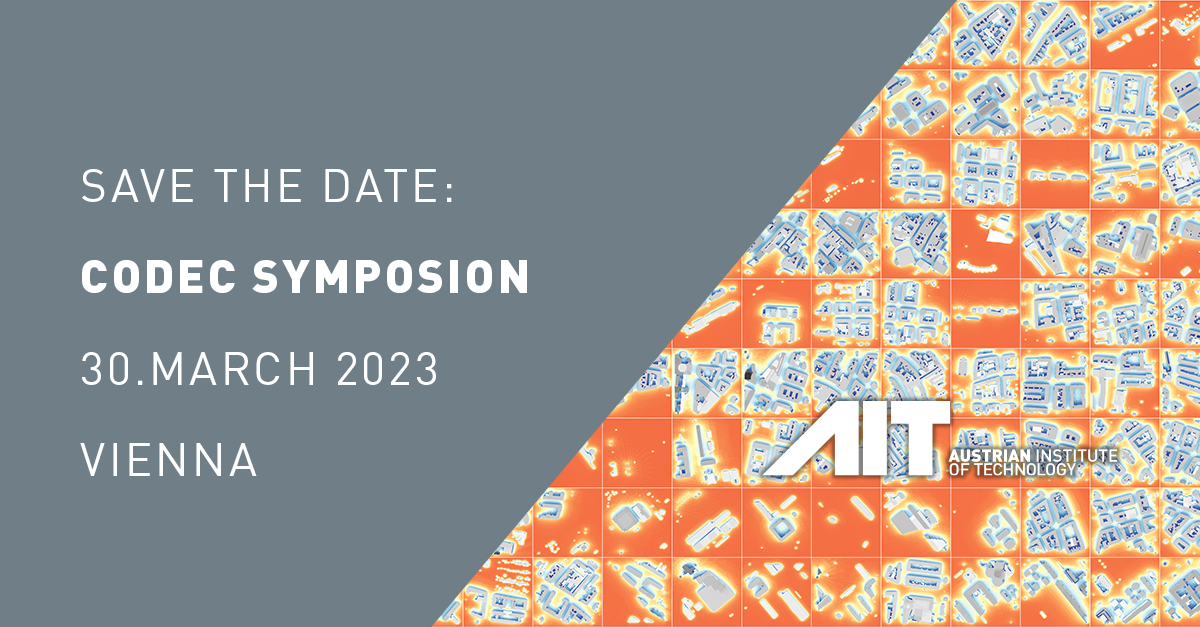We are pleased to invite you to AIT’s CoDeC Symposion, celebrating the completion of the Cognitive Urban Design Computing (CoDeC) project!
Join us to hear exciting presentations and updates of CoDeC affiliated researchers from academia and industry, presenting current developments and project successes and giving you an outlook of the future in computational urban design. After the presentations you will have the opportunity to engage in inspiring debates with the presenters, the CoDeC team and other participants at a joint dinner.
This event does not only conclude the CoDeC project, but also serves as a starting point for an open discussion on the future development of computational urban design, and a debate on how urban data, artificial intelligence and generative design methods can shape sustainable and liveable cities of the future.
During the symposion, you will also have the opportunity to experience a live demonstration of the AIT City Intelligence Lab with an interactive, hands-on presentation of the methods and tools developed within the CoDeC project.
Get your free tickets > CoDeC Symposion Tickets, Thu, Mar 30, 2023 at 9:00 AM | Eventbrite
We look forward to your participation and seeing you again in Vienna!
Date: 30th of March 2023
Time: 09:00 - 18:00 with a joint dinner as a conclusion
Venue: Reaktor, Vienna https://www.reaktor.art/en/about
Program
| Time | Program | Details | Speaker |
| 08:00 - 09:00 | Registration | ||
| 09:00 - 09:30 | Opening Address | ||
| Opening Address from the AIT Managing Directors | Wolfgang Knoll Managing Director, Austrian Institute of Technology |
||
| Welcome from the Head of Center | Wolfgang Hribernik Head of Center for Energy, Austrian Institute of Technology |
||
| The Digital Resilient Cities Unit | Markus Ray Head of Competence Unit, Austrian Institute of Technology |
||
| 09:30 - 10:40 | Symposion Opening | ||
| The Cognitive Urban Design Computing (CODEC) Principal Scientist Project |
Reinhard Koenig Professor - Bauhaus-Universität Weimar |
||
| The City Intelligence Lab | Angelos Chronis Head of City Intelligence Lab, Austrian Institute of Technology |
||
| 10:40 - 11:00 | Coffee Break | ||
| 11:00 - 12:40 | Session 01 | Data-Driven Co-Design | |
| Keynote 01 | Data Driven Design for Urban Habitat Resilience Tools and methods for the implementation of design and decision making tools enabling inclusive and resilient cities toward climate change adaptation |
Mathilde Marengo Head of Studies, Institute for Advanced Architecture of Catalonia |
|
| Knowledge Graphs for Multi-Disciplinary Co-Design of Buildings Knowledge Graphs and Ontologies in the AEC industry, and their potential to enhance data interoperability and facilitate design decisions through description logic and reasoning exemplified with the BHoM RDF Toolkit. |
Diellza Elshani Research Associate, Institute for Computational Design and Construction |
||
| A Data-enabled Participatory Process for Enhancing Neighborhood Accessibility A novel workflow of managing urban data and visualizing them with the use of a mixed reality interface for studying urban accessibility aspects of historic built environments |
Iason Giraud Research Assistant, The Cyprus Institute |
||
| Accessibility Analysis through Grasshopper Using graph theory and shortest route algorithms to analyse and visualise accessibility |
Andrej Sluka Digital Architect, REHUB FORGE |
||
| Performance-driven Design and Data Visualization: An Integrated Design-Space Explorer for Comparative Design Variant Analysis Research on an interactive and modular data processing and visualization framework for data-driven urban design |
Serjoscha Duering Digital Architect, REHUB FORGE |
||
| 12:40 - 14:00 | Lunch | ||
| 14:00 - 15:20 | Session 02 | Integrated Simulation for Sustainable Design | |
| Keynote 02 | Unleashing the Power of Simulation - Does the Performance Gap Really Matter? | Christina Hopfe Head of Institute of Building Physics, Services and Construction, TU Graz |
|
| Urban Sustainability through Computational Design The planning of a sustainable city requires intelligent methods, it will be presented how computational design approaches can be used in real planning tasks |
Theresa Fink Research Engineer, Austrian Institute of Technology |
||
| Urban Climate Design & Planning Computational tools and approaches for integrating climate adaptation into urban planning practice |
Gheyath Mohammed Computational Designer, Henning Larsen |
||
| Predictive-performative Urban Design Predictive-Performative Urban Design as a result of the impact |
Robson Canuto da Silva PhD Candidate, University of Campinas |
||
| 15:20 - 15:40 | Pecha-Kucha | FemTech Internships at the City Intelligence Lab | |
| Introduction to the FemTech Program | Angelos Chronis Head of City Intelligence Lab, Austrian Istitute of Technology |
||
| Beating the Heat: Large-Scale Shading Solutions for Dense Urban Areas | Hager El-Sokaily Student, Technical University of Vienna |
||
| From Urban Data to Design Methodology | Viktoria Tudzharova Student, University of Applied Arts, Vienna |
||
| Exploration of the Technology behind InFraReD | Anna Erdi Researcher and Software Developer, Software Competence Center Hagenberg |
||
| Interactive Geoovisualizations with Mapbox on Vienna's Aspern Seestadt | Iulia Michaela Enache Student, University of Applied Sciences Krems |
||
| 15:40 - 16:00 | Coffee Break | ||
| 16:00 - 18:00 | Session 03 | Artificial Intelligence for Resilient Design | |
| Keynote 03 | Rethinking Eco-Computational Design: Integrating Intuition and Intelligence Links between environmental intuition and intelligence in architecture |
Jonathan Natanian Head of Environmental Performance and Design Lab, Technion IIT |
|
| Keynote 04 | SENSING MACHINES Machine learning protocols for urban and environmental spatial monitoring in the scenario of Barcelona Superblocks. |
Aldo Sollazzo CEO Noumena Group, Director Master in Robotics and Advanced Construction, Institute for Advanced Architecture of Catalonia |
|
| Building Massing Generation using Deep Learning How can we use a database of existing building stock to train models capable of generating new building massing designs? |
Ondřej Veselý Product Owner, OMRT |
||
| SOCRATES - Using Computational Methods in Design Space Exploration for Sustainable Developments Methods to assist architects in quickly finding optimal solutions for given questions in urban planning, building distribution and apartment distribution by helping them explore and reduce the design space |
Pol Foreman Digital Architect, REHUB FORGE |
||
| COUP - Cockpit for Collaborative Urban Planning Interactive real-time simulation tool for tangible urban twins |
Andre Landwehr Research Associate, HafenCity Universität Hamburg Balázs Cserpes Tech Lead, HafenCity Universität Hamburg |
||
| InFraReD An Intelligent Framework for Resilient Design |
Angelos Chronis Head of City Intelligence Lab, Austrian Istitute of Technology |
||
| 18:00 - 19:00 | CIL Demos | Interactive Hands-On Demos on the City Intelligence Lab | |
| 18:00 - 18:30 | CODEC Hackathon | CODEC Hackathon Results Interactive presentation of the results of the CODEC Hackathon: |
Serjoscha Duering Digital Architect, REHUB FORGE Viktoria Sandor Research Engineer, Austrian Institute of Technology |
| 18:30 - 19:00 | CIL Demo | City Intelligence Lab Demo Interactive hands-on demo of the City Intelligence Lab |
Angelos Chronis Head of City Intelligence Lab, Austrian Istitute of Technology |
| 19:00 | Reception & Dinner |



